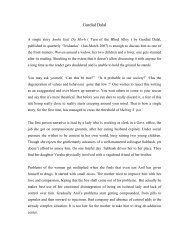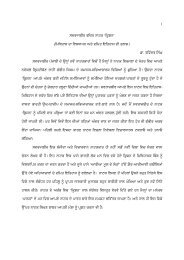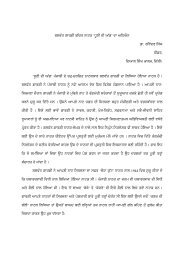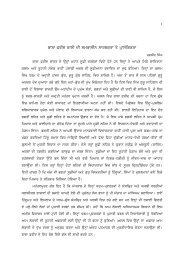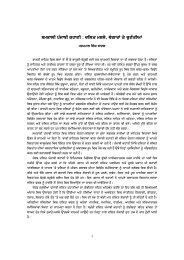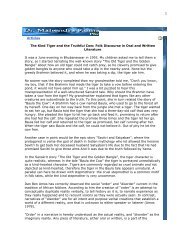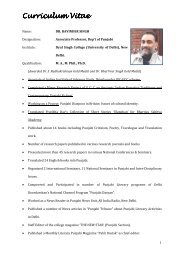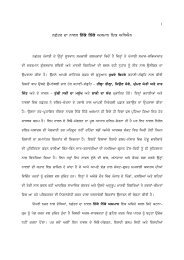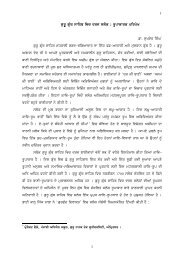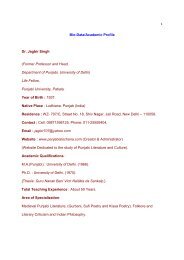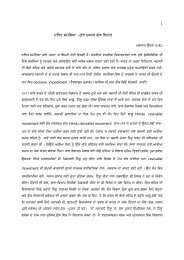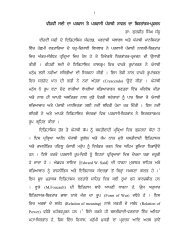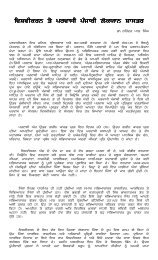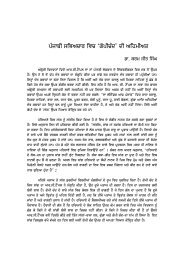Dialogue Among Civilizations-Kapil Kapoor-23 ... - Panjabi Alochana
Dialogue Among Civilizations-Kapil Kapoor-23 ... - Panjabi Alochana
Dialogue Among Civilizations-Kapil Kapoor-23 ... - Panjabi Alochana
Create successful ePaper yourself
Turn your PDF publications into a flip-book with our unique Google optimized e-Paper software.
predator group by virtue of not sharing the twin cultural imperatives of iconoclasm andevangelism. In fact by virtue of their historical experience, they are distinguished members ofthe fodder set.Let us have a brief look at the attested experience of some of these cultures. Remember thatviolence and conflict have taken place both between the fodder and the predator cultures andbetween the predator cultures themselves. The cause and character are different – in the firstcase it is sanctified explicitly as a religious mission; in the second case, it is a fight for thedistribution or possession of territory. The degree of vandalism differs in the two cases.The Jewish experience is too well known: their Diaspora, wanderings through time, theinquisition in Southern Europe, spread through Europe and Russia, the holocaust, and thestruggle for survival in their homeland. It has been one long story of persecution and violencedirected at their very being.The Books of Jeremiah are living records of their suffering, the paradigm of their recurrentexperience. Lamentations of Jeremiah may be quoted as a representation of their typicalexperience. Mournful Jeremiah sings the miseries of Zedekiah, the King of Jerusalem:“Then the King of Babylon slew the sons of Zedekiah in Riblah before his eyes: also theKing of Babylon slew all the nobles of Judah.“Moreover he put out Zedekiah’s eyes, and bound him with chains, to carry him to Babylon.”[13]This is a universal narrative. He then sings the miseries of the people:“The Lord …hath swallowed up all her palaces: he hath destroyed his strong holds, and hathincreased in the daughter of Judah mourning and lamentation.“The elders…sit upon the ground, and keep silence: they have cast up dust upon their heads;they have girded themselves with sackcloth; the virgins of Jerusalem hang down their headsto the ground.“Mine eyes do fail with tears…because the children and the sucklings swoon in the streets.“They say to their mothers, Where is corn and where is wine?“The young and the old lie on the ground in the streets; my virgins and my young men arefallen by the sword.“Fear and snare is upon us, desolation and destruction.“Our inheritance is turned strangers, our houses to aliens.“Princes are hanged up by their hands:“The elders have ceased from the gate, the young men from their music.“They ravished the women in Zion, and the maids in the cities of Judah.“The joy of our heart is ceased; our dance is turned into mourning.” [14]This is a universal narrative of subjugation, dispossession and destruction. One need not givename to it. The Jews suffered persecution and they were forced out of their homeland ormoved out for a life free of persecution. The Zoroastrian experience replicated the JewishDiaspora – they now live, the last few of them, in India, after they fled their homeland in the7th century and are on the verge of extinction. The Bahais moved over and are in India. AndTibetans fled their homeland and came to India in 1961. The Jews apparently have ahomeland; but they are completely vulnerable today – they have been gathered together fromtheir wide grazing lands and herded into a pen that is the state of Israel.



